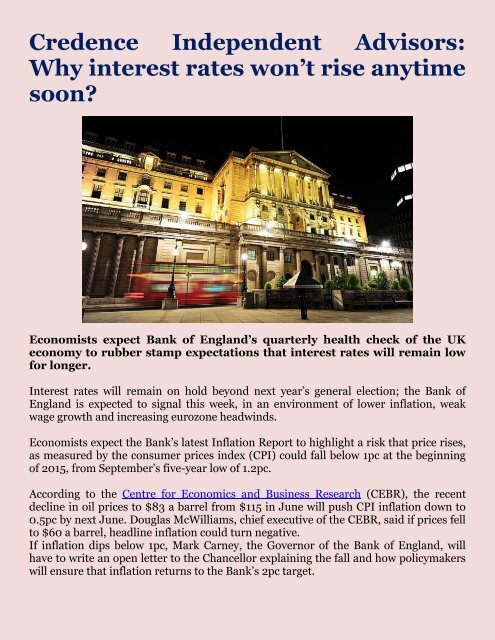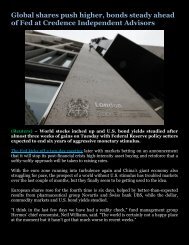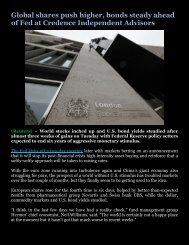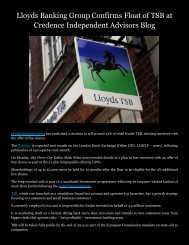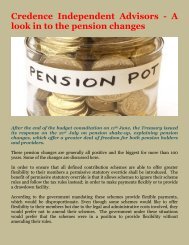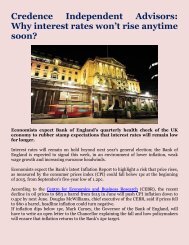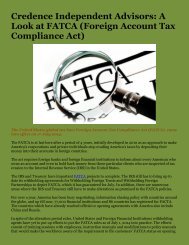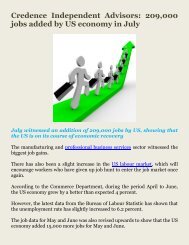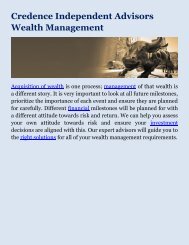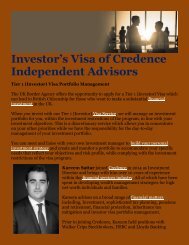Credence Independent Advisors: Why interest rates won’t rise anytime soon?
Create successful ePaper yourself
Turn your PDF publications into a flip-book with our unique Google optimized e-Paper software.
<strong>Credence</strong> <strong>Independent</strong> <strong>Advisors</strong>:<br />
<strong>Why</strong> <strong>interest</strong> <strong>rates</strong> <strong>won’t</strong> <strong>rise</strong> <strong>anytime</strong><br />
<strong>soon</strong>?<br />
Economists expect Bank of England’s quarterly health check of the UK<br />
economy to rubber stamp expectations that <strong>interest</strong> <strong>rates</strong> will remain low<br />
for longer.<br />
Interest <strong>rates</strong> will remain on hold beyond next year’s general election; the Bank of<br />
England is expected to signal this week, in an environment of lower inflation, weak<br />
wage growth and increasing eurozone headwinds.<br />
Economists expect the Bank’s latest Inflation Report to highlight a risk that price <strong>rise</strong>s,<br />
as measured by the consumer prices index (CPI) could fall below 1pc at the beginning<br />
of 2015, from September’s five-year low of 1.2pc.<br />
According to the Centre for Economics and Business Research (CEBR), the recent<br />
decline in oil prices to $83 a barrel from $115 in June will push CPI inflation down to<br />
0.5pc by next June. Douglas McWilliams, chief executive of the CEBR, said if prices fell<br />
to $60 a barrel, headline inflation could turn negative.<br />
If inflation dips below 1pc, Mark Carney, the Governor of the Bank of England, will<br />
have to write an open letter to the Chancellor explaining the fall and how policymakers<br />
will ensure that inflation returns to the Bank’s 2pc target.
Alan Clarke, a strategist at Scotiabank, said it was very likely this could happen before<br />
the end of this year. “Last December, we had a 6.5pc increase in gas and electricity<br />
prices, that’s not being repeated this year, so that will push inflation down by 0.3<br />
percentage points.<br />
Coupled with that you’ve got Sainsbury’s recent decision to cut 1,200 prices and mild<br />
autumn weather pushing down on clothing prices. All in all, if they forecast sub-1pc<br />
inflation they’re conceding that Carney’s going to have to write a letter and the market<br />
will push back the first hike even more than it already has done.”<br />
In June, Mr. Carney said the decision surrounding the timing of the first rate increase<br />
“could happen <strong>soon</strong>er than markets expect”, prompting traders to price in a November<br />
rate hike. However, an oil glut, the slowdown in the eurozone and falling inflation<br />
means markets now expect the Bank to raise <strong>rates</strong> in August 2015, well after May’s<br />
election.<br />
Andrew Haldane, the Bank of England’s chief economist, said in a speech last month<br />
that a “gloomier” global outlook and lower inflation suggested that policymakers could<br />
afford to keep <strong>interest</strong> <strong>rates</strong> lower for longer.<br />
Official data show pay growth still catching up with price <strong>rise</strong>s<br />
The Deputy Governor, Sir Jon Cunliffe, said in a separate speech that with <strong>interest</strong><br />
<strong>rates</strong> already at a record low of 0.5pc, dealing with an inflation spike would be “more<br />
manageable” than raising <strong>rates</strong> too early and having to change course.<br />
However, Martin Weale, an external rate setter who has voted to tighten monetary<br />
policy for the past three months, has argued that the Bank should “look through” the<br />
current drop in inflation because it is driven by forces that are beyond the Bank’s<br />
control, as the Monetary Policy Committee did in 2008, when price <strong>rise</strong>s spiked to<br />
5.2pc.<br />
Simon Wells, chief UK economist at HSBC and a former Bank economist, said pay<br />
growth would remain in focus for the nine rate-setters. “The first quarter of 2015 is an<br />
important time for pay settlements, and if pay surveys continue to suggest starting
salaries for new recruits and vacancies are rising and we start to see wages pick up, that<br />
would be the signal for me that this economy can withstand a rate <strong>rise</strong>”.<br />
The Confederation of Business Industry expects the UK economy to expand this year at<br />
the fastest pace since before the financial crisis. Britain’s biggest business lobby group<br />
expects growth of 3pc in 2014, which would match the expansion in 2006. Growth is<br />
then expected to slow to 2.5pc in 2015.<br />
The forecasts were unchanged from its September forecasts, despite renewed fears of a<br />
triple dip recession in the eurozone. “The recovery is on firm ground and is becoming<br />
more ingrained,” said John Cridland, the CBI’s director general.<br />
<strong>Credence</strong> <strong>Independent</strong> <strong>Advisors</strong> are always on the lookout for top quality<br />
professionals that want a long term career in financial services. Whether from<br />
Investment banking, Wealth Management or financial planning background if you<br />
would like to be with a firm with a compelling client and advisor proposition. Provide<br />
more information about clients with a financial educational framework at <strong>Credence</strong><br />
<strong>Independent</strong> <strong>Advisors</strong> Blog and <strong>Credence</strong> <strong>Independent</strong> <strong>Advisors</strong> News.


